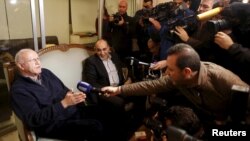Some Lebanese see Michel Samaha as the ultimate traitor, but with the trial of the ex-minister who confessed to planning terrorist attacks on home soil imminent, the country’s judicial system has also found itself in the dock.
Earlier this month, Beirut’s plush Achrafieh district echoed with calls for justice as demonstrators made themselves heard outside the home of Samaha in the first of a series of protests across the country.
A former information minister, Samaha was arrested in 2012 after being caught colluding, allegedly with a Syrian intelligence chief, to smuggle explosives into Lebanon with the aim of targeting political and religious figures. The controversy generated by what some perceived as a short sentence, four-and-a-half years, led to a planned retrial.
Samaha’s release, however, on $100,000 bail before his latest appearance at a military tribunal, has stirred anger once again. The process has put the spotlight on questions over the role of the tribunal in Lebanon, with its independence, transparency and reach under scrutiny.
Potential for war
Among a group protesting outside the military tribunal recently was 24-year-old Baker Halawi.
“It’s ridiculous; a drug dealer might get 10 or 20 years; how come someone who wanted to blow things up gets the sentence he did?” he said. “His plans could have caused a civil war.”
Leaked recordings of Samaha’s interrogations, as well as bugged conversations he had with an informant while planning attacks, are circulating in Lebanese media.
For some, the plot is a reminder of the dark days of Lebanon’s Syrian military occupation, when prominent figures who stood against the occupation risked death. This included former prime minister Rafik Hariri, whose assassination sparked a peaceful uprising in 2005 that drove out the occupation.
Halawi is part of the Future Movement, the political organization with strong Sunni support led by Rafik Hariri’s son.
For him, Samaha’s release on bail is just the latest sign of a continuing pro-Syrian regime influence on the country, this time exercised by Hezbollah, the largely Shi’ite group fighting in support of the Syrian state.
“We know courts are influenced politically, and these courts in particular are influenced politically,” said Sami Nader, a director for Levant Institute for Strategic Affairs.
“Hezbollah has influence on sensitive functions for sensitive institutions.”
Extensive powers
Created in its most modern form in the 1960's, Lebanon's military tribunal gained strength under Syrian occupation following the end of the 15-year Lebanese civil war in 1990. Unlike its civilian counterpart, it is made up of mainly military figures, many of whom have little in the way of a legal background.
And with the Lebanese army not just a military, but a political force, it is more “prone” to political influence, said Georges Ghali, who works for local human rights group ALEF.
“You don’t have the separation of powers that you do in other courts.”
Aside from political influence, the tribunal’s breadth of power and lack of accountability have alarmed civil rights activists.
Its remit extends well beyond the military into internal and external security matters, with activists voicing fears over issues including incommunicado detention and use of the court to quell dissent.
Last year, protesters arrested during the "You Stink" protests against the country's garbage pile-up faced investigation by the tribunal, while in 2013 it sentenced a journalist looking into arms trafficking to half a year in prison.
As well as attempting to transfer Samaha’s trial to a civilian court, Justice Minister Ashraf Rifi has sought to have the tribunal’s reach curtailed in a bid to “put the Lebanese justice system in harmony with international law and human rights conventions.”
Those who have defended the court highlight its role in other Middle Eastern countries and say any change could weaken Lebanon's ongoing efforts to tackle extremism.
Some attribute attacks on the court down to politics.
“But it’s not about that - the main problem is the tribunal is an unfair one, and isn’t transparent,” said Wadih Al-Asmar, general secretary of the Lebanese Center for Human rights.
“In modern democratic countries, military tribunals have less power, and it is only restricted to military issues.”
Momentum
As Samaha’s retrial approaches, the outrage is unlikely to die down.
Meanwhile, the taped confessions that have received play in certain sections of the Lebanese media will continue to be aired.
Like other activists who have campaigned on the issue for years, Ghali remains realistic about how much impact the case of the plotting minister will have on bringing about major change in the short term.
“It’s a controversial topic, and many won’t vote for it purely because of their political positioning,” he said.
At the very least, Ghali added, the tribunal is under much-needed scrutiny.
“At least now groups are getting involved with these efforts, and at least we can build on this momentum.”
Ex-minister’s Trial Shines Spotlight on Lebanon's Military Court
- By John Owens

BEIRUT —



